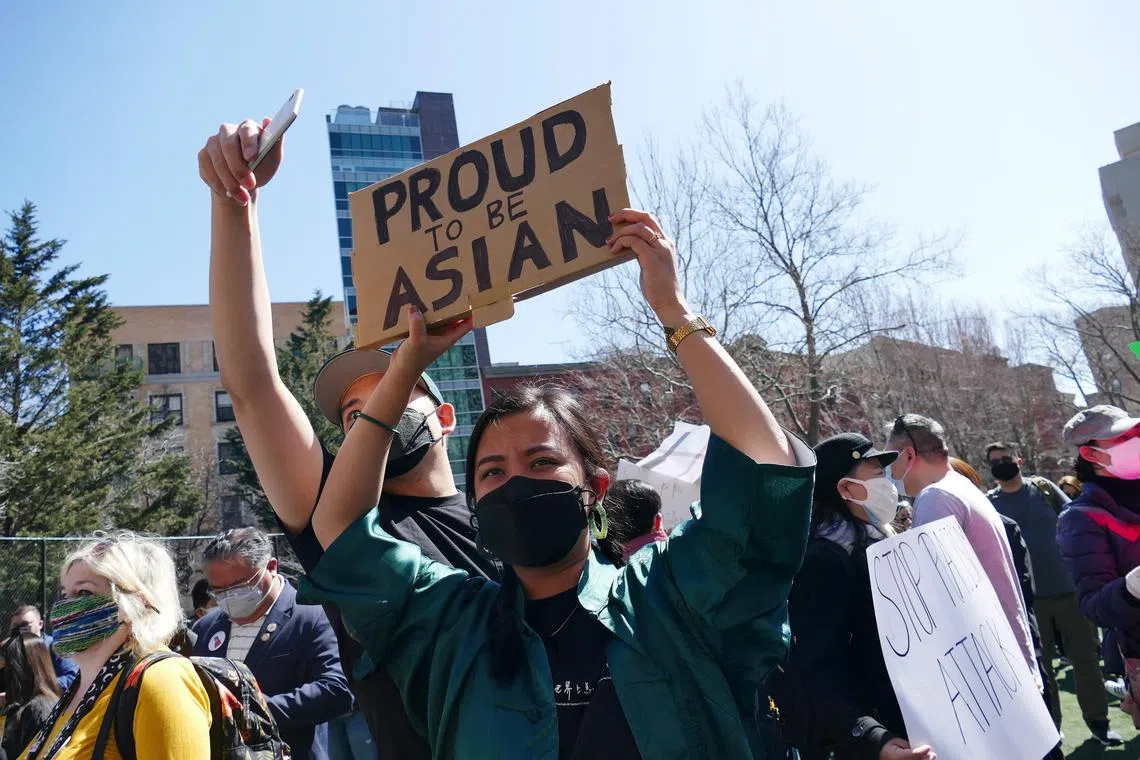Asian advocacy groups welcome White House move to counter anti-Asian hate, prejudice
Sign up now: Get ST's newsletters delivered to your inbox

Anti-Asian-hate protest at Chinatown, Manhattan, New York, on March 21, 2021.
ST PHOTO: NIRMAL GHOSH
Follow topic:
WASHINGTON – Asian American organisations are welcoming a strategy document unveiled by the White House on Tuesday that aims to address disparities and prejudice faced by Asian Americans, as well as the native Hawaiian and Pacific Islander communities.
The White House Initiative on Asian Americans, Native Hawaiians and Pacific Islanders includes action plans from 32 federal agencies. Among the priorities are combating anti-Asian hate and discrimination, the disaggregation of data across the communities, and better language access.
The long-awaited agenda comes as hate crimes against Asian Americans have risen in the last two to three years, partly on the back of the Covid-19 pandemic that former president Donald Trump – in office from 2017 to 2020 – called the “China virus”, a term he still uses.
The Federal Bureau of Investigation lists anti-Asian hate crimes – 279 of them – among the top four in its hate crime database for 2020. In a mid-2022 report issuing guidance to federal agencies, the Department of Justice noted that “hate crimes in the United States rose in 2020 to the highest level in 12 years, with a significant increase in numbers of anti-Asian and anti-Black hate crimes”.
Such crimes have not stopped. On Jan 8, a closed-circuit television camera captured footage of an elderly Asian man walking with a cane in a San Francisco neighbourhood when an attacker raced up to him and punched him, knocking him to the ground. The victim, 78, reportedly survived.
The attack was uncannily similar to another on Jan 28, 2021, when white-haired, 84-year-old Vicha Ratanapakdee, who was visiting his daughter from Thailand, was out for a walk in San Francisco’s Anza Vista neighbourhood.
He was similarly assaulted,
On Jan 11 in Bloomington, Indiana, a 56-year-old woman, identified later as Billie Davis, suddenly attacked an 18-year-old Asian student on a bus,
“It would be one less person to blow up our country,” the affidavit quotes her as saying.
The victim’s name and condition are unknown. The attacker was arrested and has been charged with attempted murder, aggravated battery and battery by means of a deadly weapon.
Similar crimes have taken place in New York.
On Thursday, The Asian American Foundation (TAAF), a support and advocacy group, said on Twitter: “Anti-Asian hate has not stopped. It has not slowed down. From the bus attack in Indiana to the… (Jan 8) assault on an Asian elder, our community remains the target of attacks.”
“We must remain vigilant,” it added. “We must continue to work together to create long-term change to end this violence.”
On Tuesday, Mr Xavier Becerra, secretary of the Department of Health and Human Services, which is leading the White House initiative, said: “For too long, systemic barriers have put the American Dream out of reach for many Asian Americans, Native Hawaiians and Pacific Islanders, and racism and xenophobia against AA (Asian American) and NHPI (Native Hawaiian, and Pacific Islander) communities continued to threaten the safety and dignity of countless families.
“But now we have a choice. We can choose to stand for equity, justice and opportunity and not the status quo.”
TAAF called the national strategy “historic” and a “momentous step forward in building greater equity for AA and NHPI communities”.
Part of the plan is to revise federal data standards on race and ethnicity, in an attempt to obtain higher-accuracy data on different communities.
New York-based Jo-Ann Yoo, executive director of the non-profit Asian American Federation, told The Straits Times: “This is great news from the Biden-Harris administration.”
The pan-Asian American community is diverse, and their needs are also diverse, she said.
“We cannot paint the entire community with one broad brush stroke. There are communities that are a bit better off, but there may be others that remain invisible, so we need to be able to identify which community needs more attention and assistance,” said Ms Yoo.
“By disaggregating, we can find out where in the AAPI (Asian American and Pacific Islander) community attention needs to be focused. This is a tremendous win for our community.”
She added: “We are burdened with the model minority myth, that we are all doing well, which is far from reality. In New York City, the updated poverty numbers show that our community is struggling with an over 35 per cent poverty rate.
“We are not all successful and doing well, and we need to dispel this dangerous myth that has stymied our community for decades.”
Among those present at Tuesday’s White House ceremony releasing the national agenda was Korean-American actor Daniel Dae Kim, who sits on the Advisory Commission on Asian Americans, Native Hawaiians and Pacific Islanders. Mr Kim is famous for his roles in television series Lost and Hawaii Five-0.
“Our communities have experienced pain and trauma with lasting mental health impacts, including depression and anxiety,” he said.
“But history has also taught us how resilient and strong our communities are. I’ve never seen our community come together the way it has over the past few years.
“And I’ve been so heartened by the support of this administration that has gone beyond the usual political rhetoric.”


